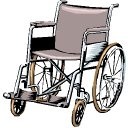AirTrans Hit With $125,000 Penalty
 The Department of Transportation
(DOT) today announced the issuance of an order reflecting a
settlement with AirTran Airways regarding the carrier's treatment
of air travelers with disabilities.
The Department of Transportation
(DOT) today announced the issuance of an order reflecting a
settlement with AirTran Airways regarding the carrier's treatment
of air travelers with disabilities.
The order finds that AirTran violated the Air Carrier Access Act
(ACAA) and federal regulations by failing to comply with
requirements for in-cabin stowage of passengers' folding
wheelchairs. The order also assesses a civil penalty of
$125,000 against the carrier.
According to the terms of the settlement, the carrier is ordered
to cease and desist from future violations of the ACAA and DOT's
rules prohibiting discrimination against passengers with
disabilities. Of the assessed civil penalty, the carrier may
use $105,000 to improve services to persons with disabilities above
what is required by DOT rules.
"During my years in Congress I co-authored the Americans with
Disabilities Act and played a major role in the enactment of the
ACAA, and I believe today as I believed then that accessibility in
transportation is a civil right," Secretary Mineta
said. "DOT will continue its effort to ensure that all
Americans, including those with disabilities, are able to enjoy the
mobility that our nation's transportation system offers."
 DOT rules require carriers to
provide in-cabin stowage of at least one passenger's standard-size
folding wheelchair on new aircraft and require carriers to permit
the stowage of passengers' wheelchairs in overhead compartments and
under seats if the aircraft has such areas available and stowage
can be accomplished in accordance with Federal Aviation
Administration safety regulations. DOT's Office of Aviation
Enforcement and Proceedings (Enforcement Office) has advised
carriers that a standard-size folding wheelchair measures 13 inches
by 36 inches by 42-50 inches when folded.
DOT rules require carriers to
provide in-cabin stowage of at least one passenger's standard-size
folding wheelchair on new aircraft and require carriers to permit
the stowage of passengers' wheelchairs in overhead compartments and
under seats if the aircraft has such areas available and stowage
can be accomplished in accordance with Federal Aviation
Administration safety regulations. DOT's Office of Aviation
Enforcement and Proceedings (Enforcement Office) has advised
carriers that a standard-size folding wheelchair measures 13 inches
by 36 inches by 42-50 inches when folded.
The Enforcement Office launched an investigation of AirTran's
compliance with the requirements for in-cabin stowage of
passengers' folding wheelchairs after it received a call on its
disability hotline in October 2002 from a passenger who said
AirTran personnel told him that there was no space to store his
wheelchair inside one of its Boeing 717 aircraft. As part of
its investigation, the Enforcement Office placed calls to the
AirTran reservations center and asked if the carrier would allow a
passenger to stow a folding wheelchair in one of these
aircraft. In many cases the agent said that the wheelchairs
must be checked at the gate and stowed in the cargo
compartment. Only after the Enforcement Office requested more
detailed information from AirTran about its wheelchair stowage
policy did the carrier agree to designate a bulkhead row containing
two seats for wheelchair stowage in addition to stowage in the
overhead bin.
 According to the settlement, AirTran
may offset part of the civil penalty by developing training
materials addressing service to air travelers with disabilities and
providing a link from the carrier's website to information
regarding DOT's toll-free disability hotline to educate and assist
travelers in resolving disability-related air travel problems.
AirTran may also offset part of the civil penalty by the costs
associated with the seat space lost in connection with the
installation of closets large enough to stow the largest
standard-size folding wheelchair on board Boeing 737-700 aircraft
yet to be delivered to the carrier, rather than using the seat
stowage method on board such aircraft.
According to the settlement, AirTran
may offset part of the civil penalty by developing training
materials addressing service to air travelers with disabilities and
providing a link from the carrier's website to information
regarding DOT's toll-free disability hotline to educate and assist
travelers in resolving disability-related air travel problems.
AirTran may also offset part of the civil penalty by the costs
associated with the seat space lost in connection with the
installation of closets large enough to stow the largest
standard-size folding wheelchair on board Boeing 737-700 aircraft
yet to be delivered to the carrier, rather than using the seat
stowage method on board such aircraft.
The department has previously issued enforcement consent orders
against several other carriers for violations of the ACAA rules,
which combined with today's actions are part of its ongoing effort
to ensure nondiscrimination in air travel based on disability.
 ANN's Daily Aero-Linx (12.03.25)
ANN's Daily Aero-Linx (12.03.25) ANN's Daily Aero-Term (12.03.25): CrewMember (UAS)
ANN's Daily Aero-Term (12.03.25): CrewMember (UAS) NTSB Prelim: Maule M-7-235A
NTSB Prelim: Maule M-7-235A Airborne-Flight Training 12.04.25: Ldg Fee Danger, Av Mental Health, PC-7 MKX
Airborne-Flight Training 12.04.25: Ldg Fee Danger, Av Mental Health, PC-7 MKX Aero-News: Quote of the Day (12.04.25)
Aero-News: Quote of the Day (12.04.25)





